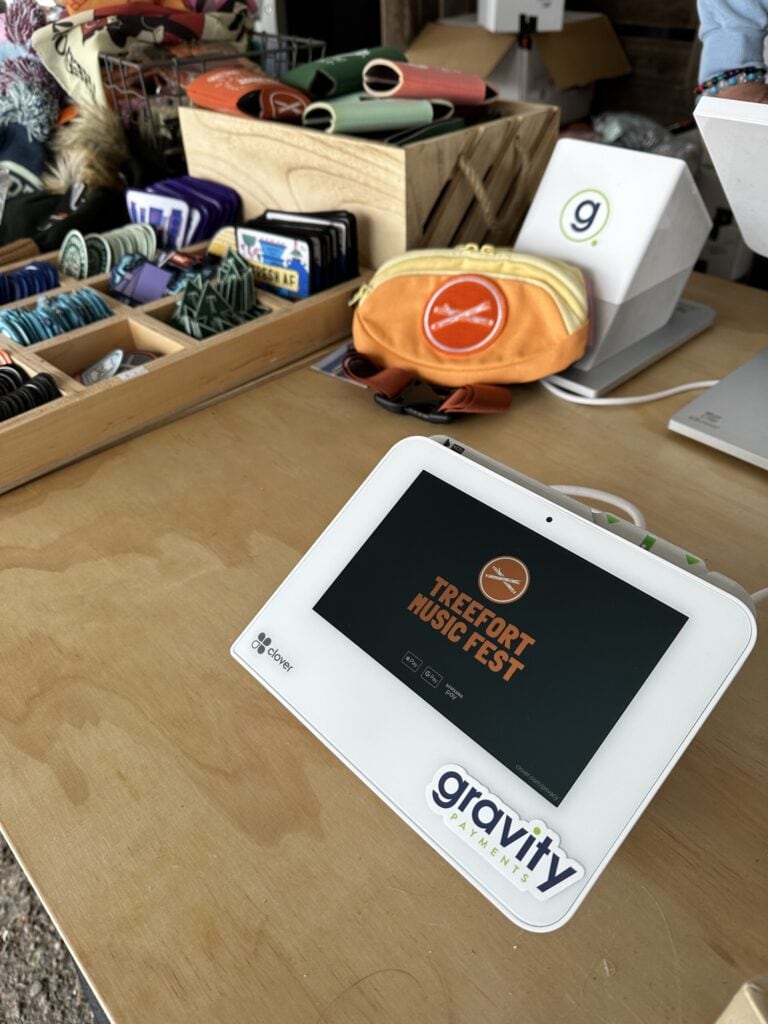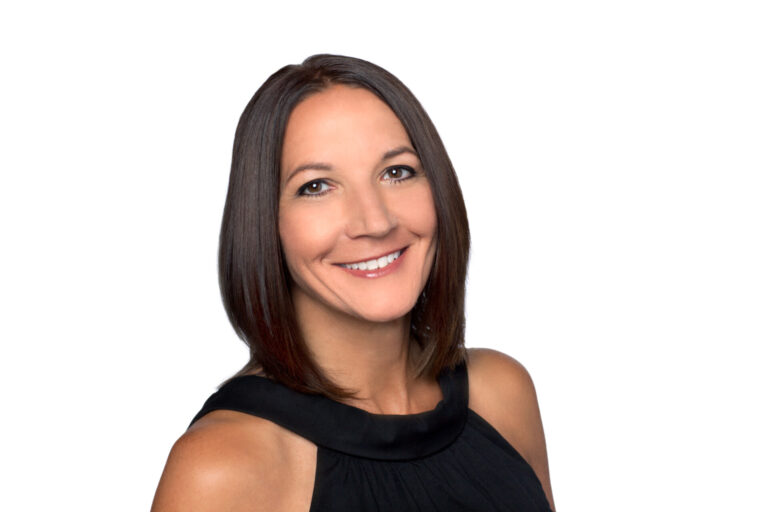April Gracz will be the first person to tell you she’s an extrovert. “I can make a new best friend anywhere,” she says. “I’m an open book.”
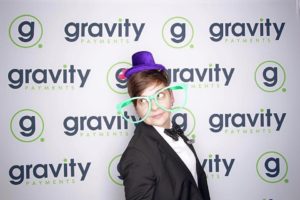
April at one of Gravity’s annual kickoff parties
She’ll also be the first person to tell you that these traits have come in handy throughout her career. Before joining the sales department at Gravity six years ago, she spent fourteen years working in hospitality, first in hotel sales and later as a bartender and manager at several restaurants and bars.
Her outgoing personality, which she says she inherited from the rest of her family, has served her well in these roles. “As a bartender, it’s fast-paced,” she says. “You have to deal with stress, and you have to deal with it very quickly, and it’s never the same. It’s never the same incident; you have to deal with it on the fly. You also have to deal with people’s personalities, things people say to you, whether good or bad, and you have to learn how to manage that. You also have to essentially make anyone who comes up to the bar your best friend. You’re selling yourself as much as you’re selling a drink or a food item.”
While extroversion may come naturally to her, she’s also adopted a philosophy that has helped her thrive: never judge anyone. It seems like a cliché, but, for April, this attitude has been honed by years of experience being on the receiving end of unfair judgments.
“I came out at 19, 20…so I’ve been out half my life if not more at this point,” she says. “I’ve been through being judged upon how I look, upon initial meeting and things like that, and it doesn’t feel good. And I’m not perfect, obviously. There are instances where I’ll judge someone, and I just try to be aware of when that happens to correct it.”
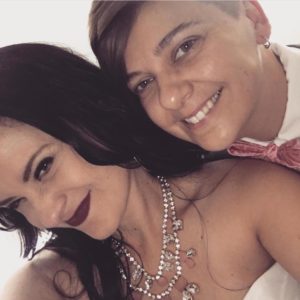
April (right) and her wife, Clare, on their wedding day in 2018
Today, April can remember having crushes on girls as far back as middle school. But growing up in a small town (population: 900) in Illinois in the nineties, she didn’t have a name for what she was feeling. “Until Ellen came out, I didn’t even know [being gay] was an option,” she says. “As like, ‘Oh! That’s a thing? You can be attracted to other ladies? It’s a thing? Oh, okay.’”
She’s referring to when comedian Ellen DeGeneres announced she was a lesbian through an episode of her sitcom Ellen in 1997. Unless you are old enough to remember the event, it’s hard to imagine how controversial this was at the time, especially now that Ellen is the most popular daytime talk show host in America. Although the episode garnered huge ratings and Ellen made the cover of Time, the news set off an intense backlash from religious groups and advertisers that eventually led to the show’s cancellation after one more season. For years, Ellen’s career stalled as she was all-but-officially blacklisted by the mainstream media.
That episode didn’t air until April’s senior year of high school, so April spent most of her teenage years living in the closet without even knowing that’s what she was doing. Ironically, her peers’ lack of awareness about homosexuality shielded April from much of the torment so often associated with high school. “I was a tomboy growing up,” she says. “I was into sports, but I coasted through this weird middle ground, where I was in the closet, dating boys, but at the same time, all the boys would come to me and talk about all the girls because I was still [their] friend. I played this middle ground. I was friends with all the guys, friends with all the girls, and so they would all talk to me about each other, essentially. No one was ever mean to me. I mean, it was a really small school, so it was really hard to be an outcast when you have a school of sixty people, essentially.”
Get the Gravity newsletter for the latest FAQs, tools, tips and tricks
Still, April didn’t completely escape judgement. “I never experienced [judgment from others],” she says. “I experienced it more as my own internal guilt.”
April was raised Catholic, and, as a kid, church played a large role in her life. Her family attended mass every Sunday, and like all good Catholic children, she celebrated her first communion and confirmation. But from a young age, she had trouble reconciling many of the church’s teachings, especially those that classified certain behaviors as mortal sins. “I couldn’t wrap my head around the idea that someone could be a great person and live a good life but still be sent to hell for something like dating someone of the same sex,” she says.
The Catechism of the Catholic Church classifies homosexual acts as “intrinsically disordered” and declares that “under no circumstances can they be approved,” so it’s no wonder a young queer woman would feel out of place within that community. Still, even after April officially broke with the church, it took some time for her to feel comfortable coming out to the world.
April realized she was gay during her senior year of high school, and her new identity helped guide her decision about where to attend college. Although she was offered a number of athletic and academic scholarships from private schools all over the country (she was valedictorian and had played basketball, volleyball, and softball throughout high school), she settled on Arizona State. “I wanted to escape small towns, to figure out who I was,” she says. “Figuring out that I was gay, I didn’t want to be in a small town. I didn’t want to be at a small school. So, I opted to go to one of the largest schools population-wise in the country.”
It was a good decision. “For the first time, I met other people that were gay,” she says. “That was huge. I learned it was okay, essentially, that it’s part of who you are, and it’s an okay thing, quote-unquote, to be…It was an opportunity for me to become who I am, and be okay with who I am.”
In college, April lived life as a lesbian and started dating her first girlfriend a few years into her time at ASU. Several months later, April decided to come out to her family. She started by writing her mother a letter (this was before email), which allowed her to say everything she needed to say without having to worry about her mother’s immediate reaction. “I was absolutely terrified,” she says, “because I had no idea how she would respond.”
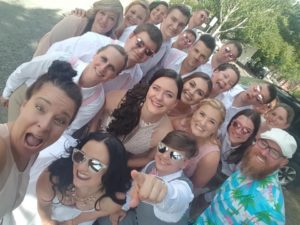
Clare and April (foreground in sunglasses) with their bridal party
Luckily, she need not have worried. After her mom got the letter, she called April and told her she just wanted her to be happy. Soon after, April came out to her father and stepmom, who were also supportive. “I’ve been very lucky,” she says. “I’ve had the support of my entire family.”
It’s unfortunate that anyone would have to be “lucky” in order to be accepted by their own families for who they are, but it’s no wonder why April would think of herself as such. Even in 2019 when same-sex marriage is legal, an openly gay man is running for president, people celebrate Pride for an entire month, and Queer Eye is one of the most popular shows on television, LGBTQ Americans still face overwhelming discrimination and hate. Fifty-seven percent of LGBTQ Americans say they have experienced slurs about their sexual orientation, gender, or gender identity. Fifty-seven percent say that they or a family member have been threatened or non-sexually harassed. Fifty-one percent say that they or a family member have experienced violence because of their sexuality or gender identity.*
Although April’s family and friends supported her, she’s still experienced her fair share of discrimination, especially while on the job. After college, April took a job with a hotel chain and moved to Seattle to pursue an opportunity with the company there (and to escape the Arizona heat). Nine years later, at the age of thirty, she moved to Pullman, Washington, where her then-girlfriend was studying at Washington State University. After living in major metropolitan areas for her entire adult life, April experienced a major shift–both physically and culturally–in her new town. Pullman is a farming community and college town on the border with Idaho, and in the early 00’s, gay people were largely unheard of there. April took a job as a waitress, and when people asked her what had brought her to the area, she usually mentioned she’d moved there to be with her girlfriend. On more than one occasion, that response was met with hostility. “There was an instance where one of the tables that I was serving asked for a different server,” she says. “And it was very apparent, as soon as I told them I was there with my girlfriend, [why]. I could see it on their face and their body. It’s a complete change in body language. They just sit up a little more, they’re more tense, no more smile, doesn’t talk. And they didn’t ask me, but they grabbed someone else and they’re like, ‘Hey, we want a different server.’ Whoever they grabbed went to the manager. So, he goes over there, and he was like, ‘Hey, what’s the problem? Did something happen?’ And they’re like, ‘Oh, well, you know, we just don’t want her to serve us because we don’t agree with her lifestyle.’”
Fortunately, April’s manager stood up for his employee and told the patrons they were welcome to eat elsewhere if they had a problem with her. They stayed, but they didn’t leave April a tip.
When April and her girlfriend broke up a few years later, she decided to move back to Seattle. “When I left [Pullman], I had people come up to me and be like, ‘Hey, you were the first gay person I met, and you really helped this town have a different view,’” she says. “[That] was really cool.”
Back in Seattle, April took another restaurant job. Not long after, one of her coworkers told her she wanted to introduce April to her best friend, Clare. Neither April nor Clare was interested in being set up, but when the two eventually met after their mutual friend convinced April to join them at a bar one weekend, they hit it off immediately. They began dating in November 2012 and got married in July 2018.
A few months into their relationship, April interviewed for a sales management position at Gravity. She was 34 and growing tired of the late-night shifts involved with bartending and waitressing. Plus, Clare lived in Portland, Oregon, so the two had been dating long distance–a complicated task made even more difficult by April’s unpredictable schedule.
During her interview with Gravity, April made a point to mention that she was gay. Earlier in her career, she’d been careful to hide her sexuality at work out of fear of discrimination or losing her job, but she’d since resolved to never work for a company that would treat her poorly just because she was a lesbian. “I was like, ‘You know what? I’m not going to live in the closet at work anymore. I won’t work for a company that doesn’t accept me for who I am.’”
Gravity offered her a job and, within a year, April transitioned to a remote sales position in Portland so she could be with Clare. Living in a famously progressive city like Portland, April and Clare occasionally experience judgment and hate, but it’s extremely rare. Most of the time, they can walk down the street hand in hand without catching a second look. And even if they do, they still feel relatively safe because they know that in Oregon they are legally protected against violence and persecution.
But they also understand that they’re not safe everywhere. Only twenty states have laws that protect LGBTQ citizens from discrimination in housing, employment, and public services. (In addition, Utah protects against discrimination in housing and employment but not public services.) And even though the House of Representatives recently passed the Equality Act (which would ban this type of discrimination in all fifty states), it’s unlikely the bill will pass the current Republican-controlled Senate. This means that April, Clare, and other queer Americans have to think critically about where they choose to live and work–even within the “Land of the Free.”
The considerations are even more critical when April and Clare decide to travel outside the United States. “I’m part Russian. I would love to go to Russia, but for safety, I can’t,” April says. “I could be thrown in jail. I could be executed in some countries.” This is especially true, she says, because of her appearance. “Clare can ‘pass,’” she says, using a term to describe lesbians who look and dress traditionally feminine. “I can’t…On the street, I’ll get slurs thrown at me. She won’t because she can quote-unquote ‘pass’ as a straight, cisgendered female. For me, as a joke, people are like, ‘Oh, you’re a hundred-footer,’ because…just based on stereotypes and things like that, it’s obvious that I’m gay just looking at me.”
Knowing first-hand what it feels like to be judged just by looking, behaving, and living her life a certain way, April works hard to never judge anyone based on a first impression. Although she admits this is not always easy, this creed has not only helped her be a more patient and effective sales person, it has made her life richer and more enjoyable.
“It’s just about giving people second chances,” she says. “Everyone has a bad day, anyone can say something harshly, and it doesn’t necessarily mean that they’re mean or a bad person or whatever…It’s taken a lot of practice, it’s taken a lot of mindfulness to [remember] that, and it’s not always easy. But I do my best to live in not judging people because I don’t like to be judged. So living by that golden rule of treating others as you want to be treated, and just moving through life in that way, that has helped me connect with people in meaningful ways.”
* https://legacy.npr.org/documents/2017/nov/npr-discrimination-lgbtq-final.pdf
Written by Brooke Carey, Lead Storyteller
Humans of Gravity is a profile series designed to highlight the unique individuals who comprise our team. Gravity Payments believes in celebrating our shared humanity by letting employees bring their full selves to work. Interested in joining this amazing group of people? Check out our Careers page for the latest opportunities.


